#Padmavati Controversy
Explore tagged Tumblr posts
Text
The Complexities of Deepika Padukone: Controversies, Mental Health Advocacy, and More
Deepika Padukone is one of the most prominent actresses in Bollywood, having achieved great success and critical acclaim in her career. However, like any public figure, she has also been involved in controversies and scandals that have made headlines over the years. In this article, we will delve into some of the most notable controversies surrounding Deepika Padukone and examine them in…

View On WordPress
#Bollywood#controversies#Deepika Padukone#drug allegations#JNU visit#mental health advocacy#Padmavati controversy#The Live Love Laugh Foundation
4 notes
·
View notes
Text
The year we painted Jesus Christ Black, a
White Supremacist shot nine African Americans
dead during a prayer service. So we threw White
paint all over the canvas and let it dry, our hearts
beating so fast as if they could hear the bullets coming.
This wouldn’t go into a museum anyway, my
classmate tells me, the night we’re packing our
bags to leave for home. When I arrive in India,
it is the year copies of The Satanic Verses are burned
in public. My friend writes to me that two bookstores in Charing Cross
Road were bombed because their shelves carried this
book. How do you feel about that? I ask myself. Imagine
one day, you write something controversial, and
instead of coming after you, they kill your readers. Maybe
this is why Goya was asked to repaint The Nude Maja as a
fully clothed woman. He didn’t want museums to be bombed.
Maybe this is why Padmavati is still Padmaavat. They didn’t
want theatres to be burned or their actresses to be hate-raped.
Maybe this is why Liu Xia stayed under house arrest for her
provocative photographs.
My country screams, we don’t want another M.F. Husain.
My Instagram screams, this post has been removed.
My mother screams, stop writing poems
about political parties and do your homework.
I don’t want my child arrested.
My art teacher tells me, one day, they’ll call us
to the ground and announce that art is illegal. They’ll ask you to say
beep if you ever want to censor something. So play smart. Write
your poems anyway. That night, my friends and I come up
with a secret plan. “We’ll write the censored words in the next line.” “Like?” “I love beep. SUMMER is a beep month. HOT food beep my
tongue. BURNS are dangerous. You know? A hidden message.” So years later, when there is a national ban on art and they
ask me if I have any poems for them, I say.
Here you go, it’s called Beep: “Beep is beautiful. NUDITY is beep.
ART questions the existence of beep.
GOD knows how beep the government is.
FASCIST men are trained by beep.
THE PRIME MINISTER wants to beep the country.
FUCK beep. CENSORSHIP on beep. Art is beep.
FREEDOM. Beep. FREEDOM. Beep. FREEDOM. BEEP. BEEP. BEEP."
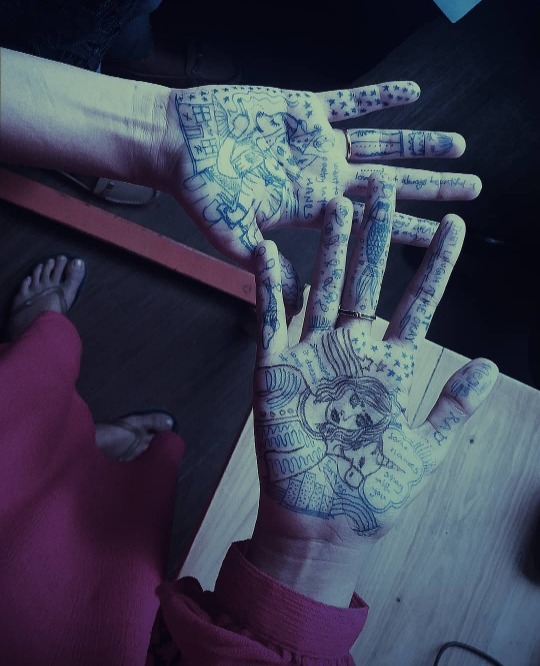
0 notes
Video
youtube
Padmavati VS Karni Sena Controversy | Chai with Chogle Episode-1 | Below The Belt
#Karni Sena#padmaavat#padmavati#padmavat release date#padmavati trailer#padmavati controversy#padmavati movie#chai with chogle#padmavati row#karni sena vs bhansali#Ranveer Singh#Deepika Padukone#shahidkapoor
2 notes
·
View notes
Photo

Padmavati: A Film Of Controversies The Plot In the limelight for all the wrong reasons, the film ‘Padmavati’, set in the 14th century narrates the legend of Hindu queen Padmavati of Rajputan caste and the barbaric ruler Alauddin Khilji.
2 notes
·
View notes
Video
Miss World Manushi Chillar BEST Reply To Karni Sena | Manushi's Reaction On Padmavati Controversy #Manushichillar #missworld #missuniverse #karnisena #padmavati #controversy #ranveersingh
1 note
·
View note
Text
వెనకడుగు వేసిన పద్మావతి..!
release-date-of-padmavati-pushed #padmavati #releasepostponed #controversy #rajputkarnisena #sanjayleelabhansali #deepikapadukone #ranipadmini #khilji #viacom18 #koradanews
రిలీజ్కు ముందే వివాదాల్ల��� చిక్కుకున్న సినిమా ‘పద్మావతి’. సంజయ్ లీలా భన్సాలీ తెరకెక్కించిన ఈ మూవీలో చరిత్రను వక్రీకరించారని, హిందువుల మనోభావాలను గాయపర్చారని ఆరోపణలు వినిపిస్తున్నాయి. మహారాణి పద్మావతి పాత్రని కించపరిచే విధంగా దృశ్యాలు ఉన్నాయని రాజ్ పుత్ లు దేశవ్యాప్తంగా ఆందోళనలు చేస్తున్నారు. ఎట్టిపరిస్థితుల్లో సినిమా విడుదల ఆపేయాలని లేదంటే థియేటర్లు తగులబెడతామని రాజ్ పుత్ కర్నిసేన సభ్యులు…
View On WordPress
#controversy#deepika padukone#padmavati#rajput karni sena#rani padmini#release postponed#sanjay leela bhansali#viacom18
1 note
·
View note
Text
Deepika Padukone on Padmavati row: I feel angry, let down and amused
Deepika Padukone on Padmavati row: I feel angry, let down and amused – Amid Padmavati protests and a bounty being placed on her head by a fringe group, Deepika Padukone said she has complete faith in judiciary and the film.
As the protests rage against Padmavati, Deepika Padukone has been a voice of reason. Refusing to bend down in front of the fringe which demands her head (literally!) for…
View On WordPress
#Deepika Padukone#deepika padukone news#Padmavati#Padmavati controversy&039;#Padmavati Deepika Padukone#Padmavati news#Padmavati protests#ranveer singh
1 note
·
View note
Note
Deepika Padukone girl crush😩😩😩😩😩 HER ROLES IN THE HISTORICAL MOVIES DUDE, SO GOOD
Mastani, Padmavati and Leela😩
NO FR padmavati was so controversial but she did is so 😩😩 well 😩😩✋🏽 and she’s so pretty!!!
#yk when ppl rate desi actresses on tiktok or smth and it’s like all the non desis say she’s not even that pretty#like idk whst they’re ON !!:#??:!?:?? she’s gorgeous as hell and prob doesn’t fit white standards 😚😚#asks
3 notes
·
View notes
Video
youtube
Padmavati vs karni sena | Chai with chogle - Padmavati Trailer | Below The Belt
#Deepika Padukone#shahidkapoor#Ranveer Singh#padmavati#padmavat#chai with chogle#BelowDBelt#AjayJadon#padmavati trailer#padmavati controversy#padmavat release date#padmavati conflict#youtube#viral video#trending videos#parody
2 notes
·
View notes
Note
Was just reading your Padamavaat fics and wondered, if you had to rewrite the story of the film within the scope of the original ending, what changes would you make to plot or characterisations? Like, an adaption of the legend was always going to end in jauhar, but your way of writing the women and their motivations feels far more real, even though you dislike the ending.
AHAHAHAHA OH POOR ANON HERE I GO.
Above all I would most like to change the movie so it doesn’t specifically focus on literal children being, presumably, peer-pressured into the fire. For one thing, I believe in real life, children and pregnant women were smuggled out of the fort and excluded from the ritual. For another, the movie already ignores the narrative of anyone who isn’t a high caste warrior and/or wife, so do we really have to have the horribleness of children being forced into self-sacrifice rubbed in our faces?
*shudders*
That said, I think you are spot on when you say that the film really had to end in jauhar --anything less would feel like a cheat. I absolutely understand that--but from a narrative standpoint, my problems with it are (1) the fact that Padmavati never really articulates her motivations and (2) the lack of any other options presented for the women.
So. Starting with (1)--yes, Padmavati gets that big speech to the other women about valor and HONOR!, etc. and in her goodbye to Ratan Sen, gives that nauseating speech about how she must take his permission even to give up her life--
(Apologies. But. You guys, even Sita, who usually--though unfairly--gets turned into an excessively devoted wife in most mainstream media very much believed that her life was her own and not her husband’s, to the point where she outright defies him in returning to her mother/effectively committing suicide. The sheer horror of that dialogue makes me shudder all over again)
--but that said, what prompts her. Is it that she’d rather die than be made a prisoner? Is it that she knows Alauddin’s character well enough that she knows that failing to capture her will break him more than defeat on the battlefield? *throws hands up, because your guess is good as mine*
Or, I propose a change that would honestly work with the rest of film as scripted/directed, albeit probably come off very controversial: have Padmavati, disgusted by Ratan Sen’s disrespectful behavior both during and after her rescue of him, realize that both her husband and her enemy are equally bad, and that, therefore, whether Chittor wins or loses, she will still be in the hands of a man she cannot love or trust. Have her--in a shoutout to Sita, honestly--throw herself into the fire, if you must, so that they both can’t have her, as neither of them deserve her. Have the film really bite into its misandrist undertones, because surely I’m not the only one who watched Ratan Sen and just. recoiled with horror?
Also, Padmavati aside, I really wanted to see--well, options for the other women, Even if you say that a woman would rather kill herself than be abused by the invaders (a valid choice! that’s fine!), I hate the implied victim-blaming of those who decide that they’d rather take their chances with the invaders, or those who’d rather die fighting, or those who’d rather try and escape, or--
The point is there is no one right way to be a woman, and I hate that the movie breaks down its roles to either Rajput swords or Rajput bangles (also, in a really gender-essential way, but that’s a different discussion). Even a quick cut of some women being offered the chance to fight/escape/something, and taking it, would allow me to watch that final scene with the awe I am meant to feel rather than the horror. Because in all those women, you guys know there were at least a few who didn’t want to go through with jauhar, and didn’t feel they could speak up--and that , to me, is chilling.
Another way to solve this problem, TBH, is to make the film’s Mehrunissa’s, too. Make her more than the sad cipher she is for most of the movie--for example, can you guys imagine the movie starting with the shot of the desert and the ostricth and Mehru’s voice narrating, “We none of us guessed what he would come to mean for us...” (Mehru would add more color and personality as a narrator than Generic Woman Voiceover.
Pair Mehru and Padmavati’s stories--as Padmavati adjusts to Rajput customs, Mehru navigates the court she grew up in, now turned upside down by Khilji’s chaos. As Padmavati tries to bond with Nagmati, have Mehru reach out to and interact with Jhatyapali. Give Mehru a voice, so that the movie’s not just one woman’s story, but many others--and then, as a bonus, you can lose the annoying and redundant scenes of “....did you know Khilji is crazy” and the weird and historically inaccurate homophobic nature of Khilji and Kafur’s interactions. (Why couldn’t they just take delight in each other’s wickedness, even if they had to both be villains? Why is Khilji so OTT abusive, and Kafur gross and depraved? Why are their scenes honestly just used to mirror the Wholesome Heterosexual Love of Ratan Sen and Padmavati?)
what that gives you, then, is an end where Mehru--in contrast to Padmavati--is a woman who chooses to survive, so that you give equal screen time and respect to both choices women made in those days, rather than just one. And plus, having Mehru’s wistful voiceover narrate Padmavati’s sacrifice warms my shipper heart would hypothetically end the movie on a “Who Lives, Who Dies, Who Tells Your Story” note (to paraphrase Hamilton), and hopefully dig into the characterization of both women.
I’m sorry for the enormous essay! Thank you for the interesting question and lovely compliments :)
#padmavaat#padmavati#mehrunisa#meta#apologies for the Ratan sen hate#and despite all this I must concede that it’s easier to criticize a script than write one myself#so please excuse my complaining
54 notes
·
View notes
Photo
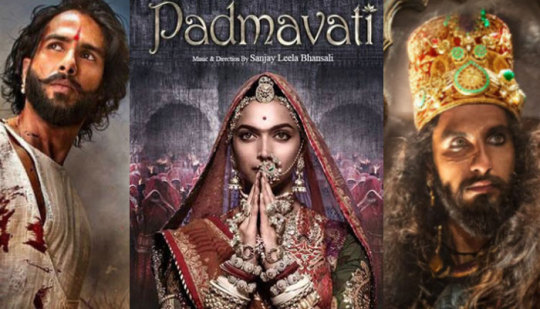
New Post has been published on https://acqro.in/most-controversial-films-in-indian-cinema/
Most Controversial Films in Indian Cinema

Indian cinema has no scarcity of films which either courted major controversy or faced complete ban and were never released in the country. Interestingly, these pictures have garnered rave critical reviews and been well-received at international film festivals. From themes that deal with communal violence to homosexuality and politics, these are some of the most controversial films ever made in India.
Garm Hawa (1973)

Garm Hawa is a film based on an unpublished story by eminent Urdu writer Ismat Chughtai. In 1947, India gained independence from the British colonial rule, but it also came at a heavy price—the division of the country to India and Pakistan. Garm Hawa tells the poignant story of a Muslim businessman who is torn between staying back in India, the land of his forefathers, or joining his relatives in Pakistan. It is one of the best films to showcase the plight of the Muslims in the country in a post-partition era. The film was deferred for eight months, fearing communal violence, before it was released.
Aandhi (1975)

This political drama centres around a woman politician whose appearance was uncannily similar to that of Prime Minister Indira Gandhi. This led the film to face allegations that it was based on her, especially Gandhi’s relationship with her estranged husband. However, the filmmakers had only borrowed the protagonist’s look from the Prime Minister and the rest had nothing to do with her life. Even after its release, the director was asked to remove scenes which showed the lead actress smoking and drinking during an election campaign and the film was completely banned during the national Emergency later that year.
Kissa Kursi Ka (1977)
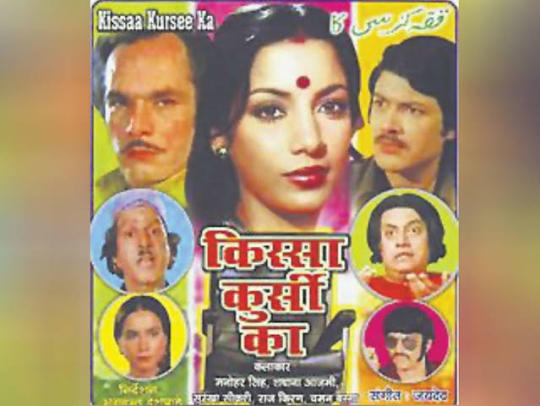
Directed by Member of Parliament Amrit Nahata, the film is a satire on the administrative regime of Prime Minister Indira Gandhi and her son Sanjay Gandhi. Kissa Kursi Ka was submitted for certification from the Central Board of Film Certification in 1975 but the country was put under Emergency the same year and so the film was banned during that entire period. All movie prints, including the masterprint, were confiscated and destroyed during the time, a move which even landed Sanjay in jail.
Bandit Queen (1994)
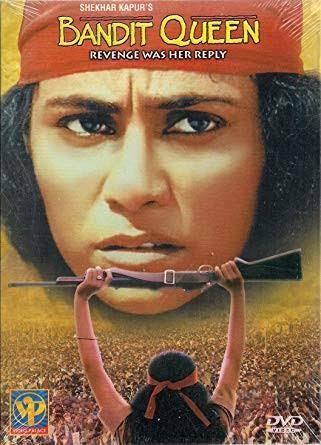
The biographical film is based on the life of Phoolan Devi, a feared woman dacoit who led a gang of bandits in northern India. Phoolan belonged to a poor low caste family and was married to a man three times her age. She later took to a life of crime. The film, directed by Bafta-winner Shekhar Kapur, was criticised for its excessive use of abusive language, sexual content and nudity. Despite the backlash, Bandit Queen went on to win the National Film Award for Best Feature Film.
Fire (1996)
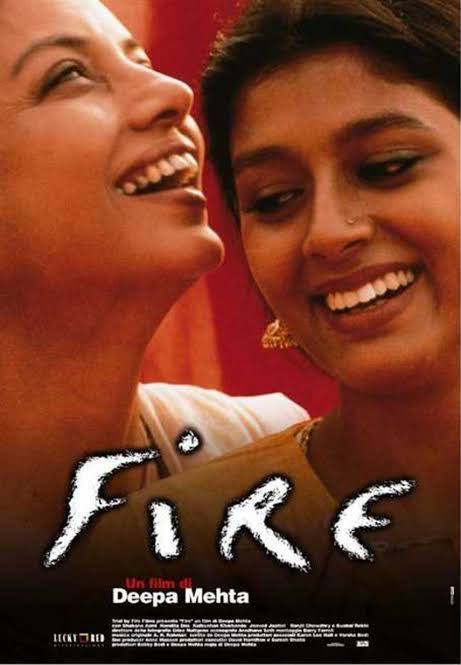
Fire is the first instalment in the Elements trilogy directed by acclaimed filmmaker Deepa Mehta. It is considered a pathbreaking film for being the first Indian cinema to explore homosexual relationship. But on its release, it faced adverse reactions with vandals burning posters and destroying cinemas where the film was being screened. Following the scandal, Fire was retracted briefly and Mehta even led a candlelit protest in New Delhi to oppose the move.
Kama Sutra: A Tale of Love (1996)

Kama Sutra: A Tale Of Love, directed by Mira Nair, was banned in India with the officials stating the film’s sexual content was too harsh for Indian sensitivities. An ironic suggestion, considering the book Kama Sutra originated in India and is easily available for purchase. Protesters labelled the film as unethical and immoral, but it received widespread critical acclaim. Kama Sutra: A Tale Of Love explores the relationship of four lovers in 16th-century India.
Paanch (2003)
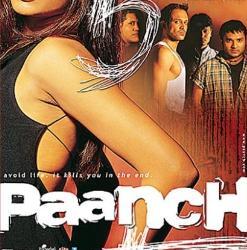
Anurag Kashyap is a pioneer filmmaker, but also one of the most controversial in the Indian film industry. He has never shied away from broaching bold topics, which may not sit well with many in the Indian community. His directorial debut Paanch, which revolves around the life of five band members entangled in a kidnapping plot gone wrong, remains unreleased to this day. Inspired by true life incidents, the drugs, violence and sex depicted in the film was considered inappropriate for the Indian audience.
Hava Aaney De (2004)

Hava Aney De is an Indo-French film which works with the sensitive subject of India-Pakistan war. The Censor Board of India demanded over 21 cuts in the film, but the director Partho Sen-Gupta would hear nothing of it. Hava Aney De, therefore, was never released in India. It did win multiple awards at film events held abroad including Best Film at Durban International Film Festival and the BBC Audience Award at the Commonwealth Film Festival.
Water (2005)

Water is the third and final instalment in Deepa Mehta’s trilogy of films. It tackles the subject of ostracism and misogyny through the lives of widows at an ashram in Varanasi. Water was believed to show the country in a bad light, and even before filming started, right-wing activists wrecked film sets and issued suicide threats. Mehta was eventually forced to move the filming location to Sri Lanka. Not only that, but she had to change the entire cast and shoot the film under a pseudo title, River Moon.
The Pink Mirror (2006)
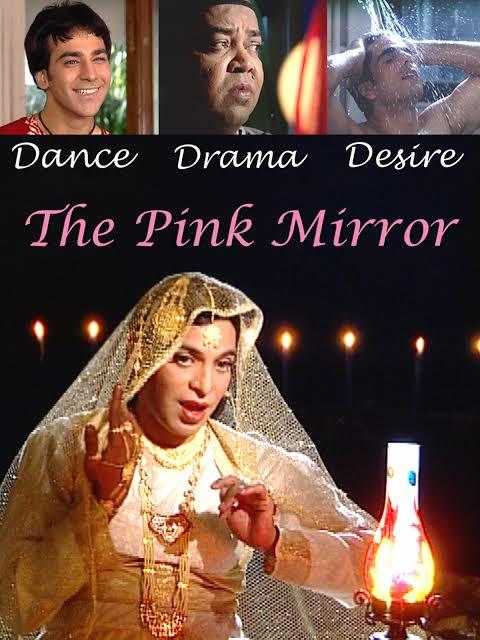
The Pink Mirror is the first mainstream film to have two transsexuals as protagonists. While it was a groundbreaking moment in Indian cinema, the Central Board of Film Certification had other opinions, calling the film “’vulgar and offensive”. The Pink Mirror remains banned in India but it went on to win the Jury Award for Best Feature at the New York LGBT Film Festival and the Best Film of the Festival at Question de Genre in Lille, France. You can catch the film on Netflix now.
Black Friday (2007)

Black Friday, another Anurag Kashyap venture, also faced a temporary ban. It deals with the 1993 Mumbai bombings, and the Bombay High Court decided to suspend the release until the trial was over. This meant that Kashyap had to wait for another three years until Black Friday hit cinemas. The film received praise from both international and national media with the New York Times comparing it to Academy Award nominees Salvador and Munich.
Parzania (2007)

Parzania is inspired by the true story of a 10-year-old boy, Azhar Mody who disappeared after the 2002 Gulbarg Society massacre during which 69 people were killed. This is one of the many incidents which led to the Gujarat riots, one of the worst acts of communal violence the country has ever witnessed. Cinema owners in Gujarat were allegedly threatened not to screen Parzania and the film went on to face an unofficial ban in the state.
Inshallah, Football (2010)

Inshallah, Football is a documentary film about a young boy from Kashmir who dreams of becoming a famous footballer. But his ambitions are crushed when he is not allowed to travel abroad because his father is an alleged militant. Critics felt the documentary showcased the reality of violence-afflicted Kashmir, but it failed to get the green light from the authorities for release in India as they felt the film was critical of how the Indian military operated in the politically sensitive region of Kashmir.
India’s Daughter (2015)
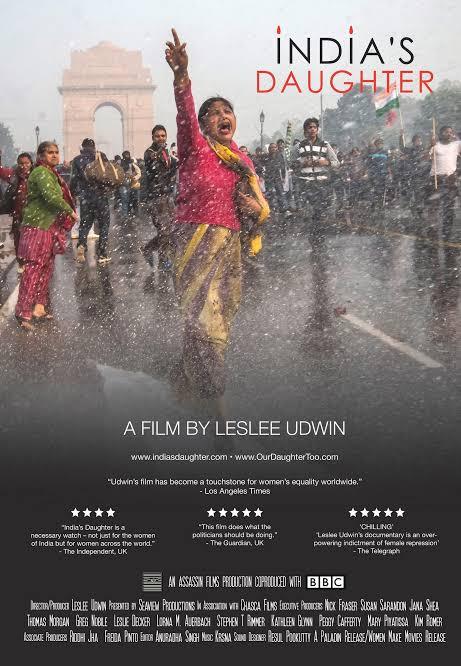
India’s Daughter is a documentary by British filmmaker Leslee Udwin and is based on the horrific Delhi gang rape and murder of 23-year-old student Jyoti Singh in 2012. The film includes an interview with Mukesh Singh, one of the four men convicted in the case. India’s Daughter was banned in India because the rapist airs certain views on gender which show the country in a poor light. These incendiary comments were believed to disturb the peace restored after a countrywide protest following news of the rape.
Padmavati (2017)

Padmavati is the latest Hindi film to court serious controversy as some right-wing groups felt that the film misrepresents history and thus tarnishes the reputation of certain communities in Rajasthan. A bounty was also put on the director and the lead actress, who portrays the historical queen Padmavati in the film. The film was scheduled for release in December 2017 but remains shelved so far. Historians, however, have debated the real life existence of the queen, with many saying she was a fictional character in an epic poem.
3 notes
·
View notes
Text
Padmavati Controversy
Padmaavat is one of the most expensive Indian films ever made and faced numerous controversies during its release. Padmaavat was released on January 25 with a smoothly running at Box Office. see more: http://www.indiacreations.in/padmaavat-box-office-collection/
0 notes
Photo

మొత్తానికి పద్మావతిని తొక్కేసారు..
https://www.myfirstshow.com/padmavati-movie-release-postponed/
భావ స్వాతంత్ర్య హక్కు ఉందంటారు.. ఎక్కడుంది అది.. భూతద్దం వేసి వెతికినా అది కనిపించేలా కనబడట్లేదు. లేకపోతే మరేంటి..? ఓ దర్శకుడు ఏళ్లకేళ్లు కష్టపడి చేసిన సినిమాను అడ్డంగా ఆపేసారు. సెన్సార్ పూర్తి కావాల్సిన సినిమాను ప్రభుత్వం కూడా దగ్గరుండి పీక మీద కత్తి పెట్టి మరీ విడుదల ఆపేసారు...
1 note
·
View note
Photo

Padmavat - On a lighter note.. ;)
#Deepika Padukone#Padmavat#Padmavati#Padmavati Controversy#ranveer Singh#Sanjay Leela Bhansali#Shahid Kapoor
0 notes
Text
Controversies Surround Padmavati - The 190-Crore Multi Starrer Movie.
Controversies Surround Padmavati – The 190-Crore Multi Starrer Movie.
Protests against the 190-crore movie accused of having a romantic scene between Alauddin Khilji and Rani Padmavati. Padmavati Controversy Padmavati is a multi-stared movie that is directed by Sanjay Leela Bansali with the main role taken up by Shahid Kapoor, Ranveer Singh and Deepika Padukone. The film is mainly based on the Rani Padmavati sacrifice. It is said to be inspired by an epic poem,…
View On WordPress
0 notes
Photo

New Post has been published on https://bollywoodtales.com/anurag-basu-will-watch-padmavati-no-matter-when-it-releases/
Anurag Basu Will Watch Padmavati No Matter When It Releases
Director Anurag Basu, who finds it bizarre that the whole controversy around Sanjay Leela Bhansali’s Padmavati is based merely on perception and assumption, says he will watch the period drama whenever it releases. Basu was at an event where he met 40 children — who are fighting cancer — from the...
#Anurag Basu#Bollywood News#Deepika Padukone#Padmavati#Padmavati Controversy#Ranveer kapoor#Sanjay Leela Bhansali#shahid kapoor#What's Hot#Bollywood Facts File
0 notes